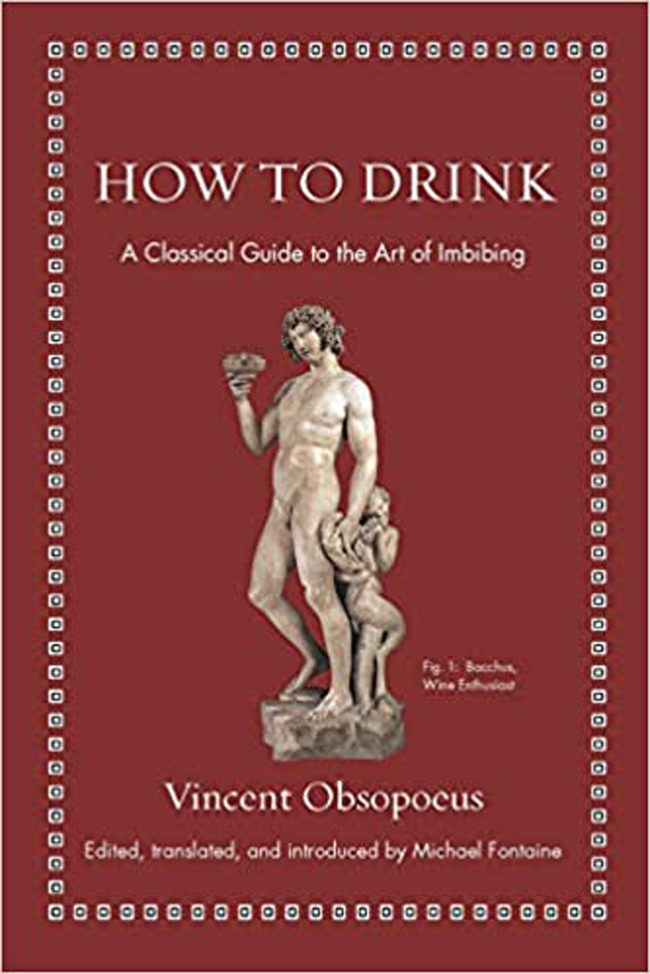
Abolitionists and teetotallers may wish to stop reading here, for this review will contain nothing but praise for the Ars Bibendi expounded in spirited Latin elegiac distichs by Vincent Obsopoeus (c. 1498–1539) and translated into intoxicating prose by Michael Fontaine as the punning How to Drink. Hard drinkers, too, may be disappointed, as this didactic poem, perhaps contrary to expectation, does not endorse inebriation. Rather, Obsopoeus advocates drinking with moderation in a humorous three-book poem inspired by Ovid's Ars Amatoria, while showing up the excesses of his time. He moves from a light lesson on responsible drinking to the headier stuff of the vices of excessive intake (though pardonable from time to time, as long as it does not become a habit) and tips for winning at drinking games, where he does not shy away from cheating to gain eternal fame as Franconia's greatest barfly.
Obsopoeus is well-served with a reader so attuned to puns and humour as Fontaine, author of, inter alia, Funny Words in Plautine Comedy (Oxford, 2010) and translator of John Placentius, The Pig War (New York, 2019) (as Michael Phontaine) and the forthcoming Marcus Tullius Cicero: How to Tell a Joke. An Ancient Guide to the Art of Humor (Princeton, NJ) in the same series as the book under review. At all times, the translation is lucid and faithful to the Latin in terms of inventio (although not literal), while the endnotes are kept to a sober minimum. The introduction is a brief, informative and entertaining survey of the life and times of the author and the contents of his poem. While not intended as a standalone edition (see below), I expect that Fontaine's vintage effort will be the port of call for some time.
As Fontaine explains, his edition is a ‘third edition’ (xv, xxii-xxiii), which is something of a blend of the first edition of 1536 and the expanded second edition of 1537. Although the latter edition is the basis for his text, Fontaine uses the first to silently correct typos in the latter and vice versa, while implementing some (eminently sensible) corrections of his own (273–274). At times, he omits expansions from the second edition (e.g. 1.202-8, 555-824; 3.403-624 with, resp., 277 n. 4, 277-8 n. 15, 281-2 n. 10) and once rearranges lines (2.568-72) to maintain the flow of the argument. Sometimes, he prints digressions from the second edition (so 2.811-862 with 280-1 n. 29). In all cases, the line numbering vis-à-vis the second edition has been retained. In short, this is a serviceable diplomatic edition aimed primarily at readability and not designed as an editio maior: not quite a Grand Cru, then, but certainly no Château Migraine.
Especially noteworthy is Fontaine's style of translation (to which this review gestures). He not only effectively conveys Obsopoeus’ classicising Latin into idiomatic American-English, but also transports it into the binge-drinking ‘bro culture’ of American ‘college kids’ (xxiii-xxvi). This modernising frame works quite well to illustrate how Obsopoeus’ strict Reformation-era environment of learned German aristocrats and clergy functioned and only very rarely becomes forced or irksome (the translation of heus as ‘dude’, twice at 3.244-5, to enhance the atmosphere of frat boy shot-taking, may be taking the colloquialisms a tad too far for some). Rather than offering the translation as a way into the Latin, Fontaine's translation is very readable on its own and will give the Latinless reader a good sense of the poem. Conversely, the Latinate reader will want to look at the translation for help in uncovering the poem's rich sediment of puns and wordplay. The reader is furthermore assisted by Fontaine's ([sub]sub)headings and visual aids such as bullet points when Obsopoeus assumes the mantle of the discursive schoolmaster.
A wee nip from a section entitled ‘German Drinking Habits Are Appalling’ and subtitled ‘Frat Culture’ (p. 138, 2.425-428): ‘That's how great the excess is; that's how great the waste of wine is; that's how many cups are drowning and overflowing with alcohol. Nobody's upset by at this outrageous sight; they're saying “Here, here! Good ol’ German hermanos are partying here!”’ (Fontaine's emphasis; Tantus adest luxus, tanta est profusio vini, | tot submersa mero || pocula plena fluunt. | Non movet haec quemquam facies turpissima, dicunt | “Hic hic Germani || distribuere boni!”). The accompanying endnote duly explains Obsopoeus’ pun in Germani on the ‘bromance’ of German drinking-brothers. I would add that germanus in the sense of ‘truthful’ or ‘real’ stresses boni to comic effect (‘the real honchos’), while hic hic likely plays on the hiccups emitted by the sloshed partygoers, whether through onomatopoeia or a bilingual pun (although Ger. Hick and cognates are not attested for Obsopoeus’ time in the standard dictionaries).
Beyond historicising the phenomena of ‘drinking culture’ and potodidaxis, this is also quite simply a witty, entertaining and well-produced book, whose editor/translator is clearly well-matched to the subject-matter: in Fontaine's capable hands, Obsopoeus is anything but an acquired taste. How to Drink is a more amusing and useful gift than a bottle of plonk: with one of the most apocalyptic and depressing years in modern history behind us and a glimmer of better times ahead, one could do worse than to follow its advice. Perhaps Fontaine will follow up with a chaser of Matthaeus Delius filius’ On the Art of Joking/De Arte Iocandi, which alludes to Obsopoeus’ poem (cf. B.C. Bowen [2003], ‘A Neglected Renaissance Art of Joking?’, Rhetorica: A Journal of the History of Rhetoric 21.3, 137-48)? I'm game.

